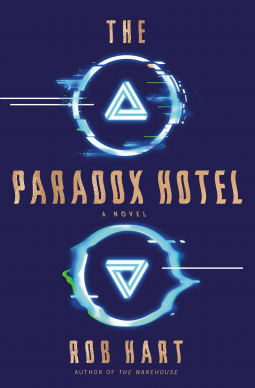I’ve been reading a lot of delightful books recently. Here are a few for your consideration.
The Galaxy, and the Ground Within, by Becky Chambers (Harper Voyager)
Set on an uninhabitable planet whose only value is as a stopover for other worlds, this story explores what happens when members of very different species and histories are forced into community when they are temporarily cut off from contact with the larger Galactic Commons. Three of these strangers are guests at the overwhelmingly hospitable Five-Hop One-Stop version of a spacer’s truck stop when a freak accident halts all traffic and communications. At first glance, they have little in common: an exiled artist with an urgent, perhaps redemptive appointment to keep, a cargo runner with a military history at a personal crossroads, and a mysterious individual who cannot leave her space suit but is doing her best to help those on the fringes. Add to this odd grouping, their host and her teenager, furred quadrupeds that reminded me repeatedly of space otters. Most of all, though, this book is about how people who are initially not only diverse but at odds with one another can bridge those differences through understanding and shared experiences to form friendships and, ultimately, community.
Crazy in Poughkeepsie, by Daniel Pinkwater; Aaron Renier illustrator (Tachyon)
 It’s difficult to find words to describe a Daniel Pinkwater book because they are a unique breed that defies the usual literary terminology: they’re enchanting (often literally), playful, spontaneous (as in combustion, upon occasion), and hilarious-yet-insightful. In other words, a Daniel Pinkwater book provides the occasion for parents wrestling the copy from their kids, and vice versa, so why not avoid bloodshed, or paper-shred, and read them aloud together?
It’s difficult to find words to describe a Daniel Pinkwater book because they are a unique breed that defies the usual literary terminology: they’re enchanting (often literally), playful, spontaneous (as in combustion, upon occasion), and hilarious-yet-insightful. In other words, a Daniel Pinkwater book provides the occasion for parents wrestling the copy from their kids, and vice versa, so why not avoid bloodshed, or paper-shred, and read them aloud together?
Mick’s ordinary life comes to a screeching 180 degree turn when his older brother returns home from Tibet with Guru Lumpo Smythe-Finkel and his dog, Lhasa, and Mick finds himself—how, he’s never entirely clear—the guru’s new disciple. Guru, disciple, and magical dog set off on a quest that’s as notable for its vagueness as its unpredictability. They acquire fellow travelers, graffiti-fanatic Verne and Molly, a Dwergish girl (sort of like leprechaun trolls with hidden goals, magical powers, a gift for making friends, and a charmingly madcap sense of humor). Soon they’re cavorting with a ghost whale who is the essence of love, as well as other wacky and memorable characters.
Pinkwater’s in on a great secret: if you want to communicate wisdom to young readers, first make them smile. Or giggle. Or run wild in Poughkeepsie, as the case may be.
The Dispatcher: Murder by Other Means, by John Scalzi (Subterranean)
Part noir detective story, part thriller, part inventive science fiction that examines a world in which death is not permanent (well, certain kinds of death and mostly), this is newest adventure in John Scalzi’s “The Dispatcher” series. I hadn’t read the first one but quickly found that didn’t matter. Scalzi skillfully weaves in all the necessary backstory with nary a plot hiccough.
In Scalzi’s world, a few years ago almost all folks who were murdered don’t die, they reappear in a place they feel safe, like a childhood home. Natural deaths are something else: you die, you stay dead. A new profession has arisen, that of “dispatcher,” a not-murderer for hire. If you’re about to die naturally, you hire them and get another chance at life. Most of the time. But business has been drying up, and Tony Valdez has been taking on cases that blur the shady line of what’s strictly legal. Like killing a Chinese executive so he can re-appear thousands of miles away in time for an important business meeting. At this point, Scalzi propels Valdez firmly into thriller territory, with plenty of dramatic tension, noir mystery, and danger. In Scalzi’s superlatively competent hands, it all comes together seamlessly for a can’t-put-it-down ride.
Paper & Blood (Book Two of the Ink & Sigil series, by Kevin Hearne (Del Rey)
I’m a huge fan of Kevin Hearne to begin with, and his “Ink and Sigil” series is a delight. As a former student of calligraphy, I love the idea that the written word is magical. In this series, set in the world of the Iron Druid, scribes create magical spells using not only words, but painstakingly prepared pens, inks, and paper. The spells include the Sigils of Unchained Destruction, Restorative Care, Agile Grace, Muscular  Brawn, and Quick Compliance and are used to protect the world against malevolent gods and monsters.
Brawn, and Quick Compliance and are used to protect the world against malevolent gods and monsters.
Our everyman-hero, Al MacBharrais, is under a couple of nasty spells himself. If he speaks to someone more than a few times, they loathe him (this happened to his own son), and his apprentices die violently after a year of service. This isn’t good news for his hobgoblin apprentice, Buck Foi. While Al is searching for a way to lift his misfortunes, his fellow sigil agents go missing in the wilds of Australia. Al and Buck are off to the rescue, joined by one of the missing agent’s apprentices, his receptionist Gladys Who Has Seen Some Shite, a few sundry allies, and the Iron Druid himself. The search leads them to a forested preserve, where chimeric monsters lie in wait. These critters are sometimes more effective and lethal than others, but always inventive: a turtle-dragon-spider, an eagle bull, a scorpion with a rat’s head (ugh), pygmy goats with fanged snake heads, a gorilla elephant, a yak badger, and my favorite, a zebra possum.
All in all, this is a quick, fun read filled with plot twists and delightful characters but also depth, the best combination.
“Abandoned cheese is a sure sign that something’s gone wrong.”
The Paradox Hotel, by Rob Hart (Ballantine)
If we ever managed to figure out time travel, who would control it? How would we prevent time tourists from messing with the past—and would that warp the present, as in the grandfather paradox? In Rob Hart’s latest novel, The Paradox Hotel, the US government has been policing time tourism and historical research expeditions, only now they’ve run out of funds and the franchise is about to go to auction.
January Cole works security at the Paradox Hotel, which hosts time travelers awaiting their scheduled “flights to the past” at the nearby Einstein Institute. She’s a seasoned time traveler herself, having made many trips as part of the policing agency. As a result of spending too much time in the past, she’s become Unstuck, with the result that she often sees events and people from prior times. The best of these incidents allow her to be with her sweet, loving girlfriend, now dead. But January’s condition is worsening, and she’s not only seeing the past but the future. That future includes a corpse in Room 526.
With trillionaires arriving for the auction, baby velociraptors on the loose, and January’s grip on the present moment growing ever less reliable, it’s inevitable that more things will go wrong…starting with a series of “accidents” befalling the powerful, ultra-wealthy bidders. Clocks run backward, time seems to stutter, the treatment for being Unstuck no longer works, and January’s running out of time to stop the murder.
I loved the convolutions of time, January’s wrestling with grief and guilt, the dips into the past, and of course, the baby velociraptors that grow much too fast, all with the fast pacing of a thriller. In short, Hart’s time-twisting murder mystery satisfies on many counts.
Something Perfect, by Laura Anne Gilman (Faery Cat Press)
Just in time for Valentine’s Day comes a sweet, sexy novella from Laura Anne Gilman. It’s a romance between a long-married couple, Jenny and Nic, who feel more complete with a third person. Luck hasn’t favored them so far, as triads or throuples aren’t for everyone. Polyamory requires excellent communication skills, integrity, and generosity of heart. Frustrated with having their hearts broken from yet another breakup, Jenny asks Nic to use his scrying talent to find their perfect partner.
 “When you see the curve of their face reflected in glass and moonlight,” goes his reading. “The city shining on their skin. When you see that, you’ll know.”
“When you see the curve of their face reflected in glass and moonlight,” goes his reading. “The city shining on their skin. When you see that, you’ll know.”
Years go by, until Jenny attends an exclusive party in New York City and spots Amy sitting alone on the moonlit patio. Jenny knows she’s “the one.” Courtship is difficult enough, but between three people it’s a real challenge, especially when one of them is as insecure as Amy, who’s convinced she “isn’t good at sex” and will never find the right partner. Nic’s “Seeing” may have started the ball rolling, but it takes more than magic to forge strong, resilient relationships.
There was so much I loved in this story, and it’s all beautifully rendered: the strength and clarity of Jenny and Nic’s marriage and their ability to communicate in a loving, nonjudgmental fashion; the absence of plot stupidities and misunderstandings that serve no other purpose than to draw out tension, when a simple conversation would resolve them; the positive portrayal of sex and multiple relationships, one that trusts the reader’s intelligence; and most of all, a thread of gold running through the story, the importance of consent. Asking for it, giving it, checking in, taking it back, celebrating it. And the wonderfully juicy erotic bits are great, too.
Within Without (A Nyquist Mystery), by Jeff Noon (Angry Robot)

This is the third “John Nyquist Mystery” I’ve read and it’s by far the weirdest. Nyquist’s latest case involves the theft of a sentient, essence-of-glamor image that has gone missing from its host. To
investigate, Nyquist and his new assistant travel to the city of Delirium, guarded by boundaries that are far more than checkpoints or physical barriers. Their search for the magic practitioner who created and attached the image to begin with leads them into increasingly bizarre cities-within-cities. In Escher, Nyquist discovers his “Inverse,” the character hidden within his psyche, and it turns out to be Gregor Samsa, the narrator of Kafka’s Metamorphosis, who wakens one morning to discover he has turned into a cockroach. So Nyquist must deal not only with Samsa’s personality and voice, but that of the cockroach. As if that weren’t strange enough, his assistant has become infected with a creeping magical substance and, obsessed with taking the image, named Oberon, for his own, disappears. Plot twists abound, building until Nyquist finds himself in an utterly different plane of existence, one in which the images define and distort reality. The book carries forward and intensifies the hallucinatory texture of the previous Nyquist novels.
